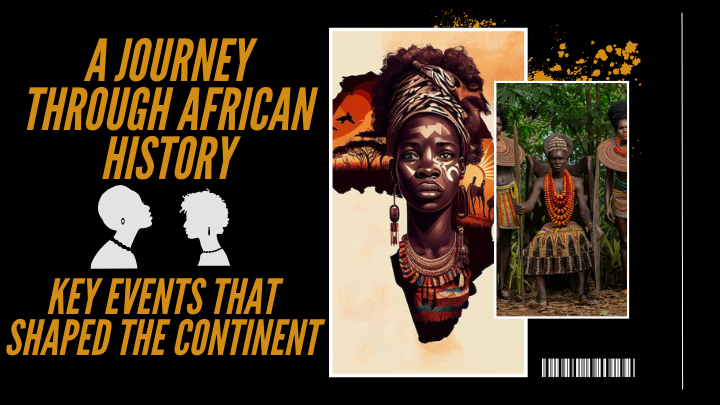Journey through African history
Africa, often called the cradle of humanity, is a continent rich in history, culture, and diversity. Spanning thousands of years, its historical events have not only shaped the lives of its people but also left a profound influence on communities worldwide, including those in countries like Australia. From ancient civilizations to the struggle for independence and the ongoing challenges of modern-day Africa, key moments in African history have echoed across generations.
In this article, we explore some of the most significant events in African history and how they continue to influence African communities globally.
1. The Rise of Ancient African Civilizations
Africa is home to some of the world’s earliest and most advanced civilizations. The ancient Egyptians, for example, built one of the most sophisticated cultures of the ancient world, with monumental achievements in architecture, mathematics, and writing. The Pyramids of Giza, the Sphinx, and the Nile River played pivotal roles in shaping not just Egypt but also the broader African landscape.
Similarly, the Kingdom of Kush (located in modern-day Sudan) and the Mali Empire in West Africa became centers of power, culture, and trade. The Mali Empire’s famous ruler, Mansa Musa, is remembered for his wealth and for spreading Islam across West Africa. These ancient empires laid the foundations for Africa's cultural and intellectual legacy, which is still celebrated today.
2. The Transatlantic Slave Trade (16th to 19th Century)
One of the darkest chapters in African history, the Transatlantic Slave Trade forcibly removed millions of Africans from their homeland. From the 16th to the 19th century, millions were sold into slavery and transported to the Americas, Europe, and the Caribbean. This tragic event not only devastated African societies but also had long-lasting social, economic, and cultural consequences.
In African communities around the world today, including in Australia, the legacy of the slave trade is deeply felt. The history of slavery informs much of the African diaspora’s shared identity and the ongoing struggle for equality and justice. Celebrations like Black History Month and community activism serve as reminders of this painful past while honoring the resilience of those who were affected.
3. The Scramble for Africa and Colonialism (Late 19th Century)
The late 19th century saw European powers scramble to divide Africa among themselves, leading to the colonization of the continent. The Berlin Conference of 1884-1885 resulted in the artificial borders that continue to impact African countries today. Colonial rule often involved exploitation of Africa's natural resources, subjugation of its people, and the imposition of foreign cultures and systems of governance.
African resistance movements against colonialism, such as the Mau Mau Uprising in Kenya and the Algerian War of Independence, played a crucial role in the eventual decolonization of the continent. The effects of colonialism are still felt across Africa, with many nations continuing to struggle with political instability, economic challenges, and the legacy of artificial borders.
4. The Struggle for Independence (Mid-20th Century)
The mid-20th century marked a turning point for Africa, as countries began to gain independence from their colonial rulers. Ghana became the first African country to achieve independence in 1957, setting off a wave of decolonization across the continent. Figures such as Kwame Nkrumah, Nelson Mandela, Patrice Lumumba, and Jomo Kenyatta became symbols of the struggle for freedom and self-determination.
In Australia, the African diaspora often looks to these figures as symbols of resilience and hope. Their stories inspire pride and solidarity among African communities and encourage the continuation of the fight for equality and recognition in societies like Australia.
5. The Apartheid Era and the Rise of Nelson Mandela (1948-1994)
One of the most significant struggles in African history took place in South Africa under the system of apartheid. From 1948 to 1994, the South African government enforced a policy of racial segregation, oppressing the majority Black population and denying them basic rights. The struggle against apartheid became a global movement, with international campaigns calling for boycotts and sanctions against South Africa.
Nelson Mandela, imprisoned for 27 years, became the face of the anti-apartheid movement. His release in 1990 and his eventual election as South Africa’s first Black president in 1994 marked the end of apartheid and the beginning of a new democratic era. His message of forgiveness, unity, and reconciliation continues to resonate across Africa and among African communities worldwide.
6. The African Union and Pan-Africanism (21st Century)
In the 21st century, African countries have made significant strides toward political unity and cooperation. The African Union (AU), established in 2001, aims to promote peace, security, and economic development across the continent. The organization works on issues such as conflict resolution, human rights, and the promotion of African cultural and economic interests.
Pan-Africanism, the idea of solidarity among people of African descent worldwide, has also seen a resurgence. Movements like #BlackLivesMatter and the continued fight for social justice have roots in the Pan-African ideals championed by leaders such as Marcus Garvey and W.E.B. Du Bois.
In Australia, African communities are increasingly looking to the African Union as a symbol of unity and strength. This sentiment resonates with immigrants who are working to build stronger, more connected communities that celebrate their African heritage while integrating into Australian society.
7. Modern-Day Challenges and the Path Forward
Despite the progress made over the years, Africa faces numerous challenges in the 21st century. Issues such as poverty, political instability, climate change, and conflict continue to affect many African nations. However, Africa is also experiencing a cultural and economic renaissance, with young entrepreneurs, artists, and activists driving innovation and change.
The African diaspora in countries like Australia plays an essential role in raising awareness about these challenges while also contributing to the development of African nations through remittances, investment, and knowledge-sharing.
The history of Africa is a rich tapestry of triumph and tragedy, shaped by the resilience of its people and their relentless pursuit of freedom, justice, and prosperity. The key events that have defined the continent continue to influence African communities worldwide, including in Australia, where the African diaspora remains a vital part of the cultural and social landscape. By understanding and honoring Africa’s history, we can better appreciate its ongoing contributions to the world and support its journey toward a brighter future.



